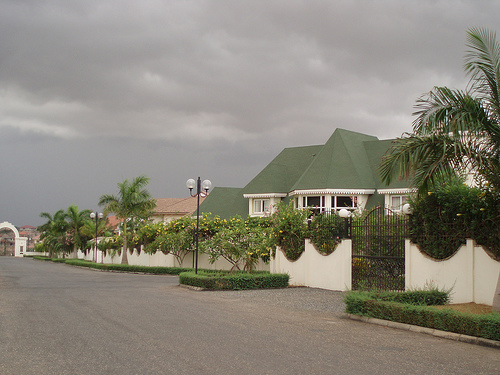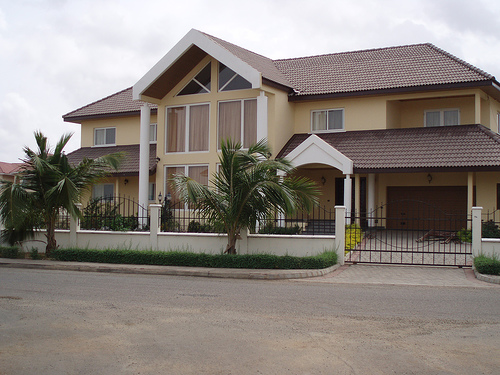Sought-after residential neighbourhoods have developed in Accra in the last ten years, some with sophisticated names like Manet Cottage, Manet Ville, Trasacco Valley, Taysec Gardens and Ballon Court. They offer the ultimate suburban lifestyle: beautiful homes, pools, security guards and location. Trasacco Valley, for example, looks like a neighbourhood the desperate housewives of Wisteria Lane could live in.


Lavender Hill sounds like one of these posh gated communities, but it’s not. Despite its pretty name, it stinks. This site is where liquid waste from the city is dumped into the sea daily, and residents and road users have been complaining of the stench and health hazards for years. The Accra Metropolitan Assembly (AMA) has been promising to shut down Lavender Hill since 2010, but the dumping continues daily.
- See pictures of the waste disposal here.
I recently took a taxi from the CBD in Accra to Lavender Hill, a mere ten-minute drive. The taxi driver offered some advice on the way there: “My brother, you might throw up by the time we reach the end of [Accra Beach Road]. Even with the windows closed, you’ll still get the stench.”
We passed some houses when we reached Lavender Hill, and I stopped to chat to some of the residents.
Unlike me, Nancy Awuah wasn’t showing any discomfort with the foul smell in the air, and I did not want to show any disrespect by covering my nose. She and her husband moved to the neighbourhood from Maprobi since it was closer to where he works. “The smell was tough in the beginning but we have gotten used to it … other people live with other smells around them. In some parts of the country that l have lived in, the people have to smell cocoa waste all their lives and so [this] is the same,” Nancy told me.
I asked her about the health hazards of living near a highly polluted site. “We only smell the stench, what about those of you who eat the fish that feed on the human waste?” She had a point – most of the fish sold in the markets around Accra are sourced from the James Town fishing community.
James Mensah, who has lived here for ten years, gave me a short history of Lavender Hill. “At first it didn’t have a name because it was not part of any of the city’s suburbs and no one wanted to live here because it was a waste dumping site. But by the middle of the 90s, with the high demand for accommodation in the city, some smart people thought of making money by encroaching on the land around the place and built houses for rent. Desperate people who could not afford the high rent in the city moved in gradually and before we all knew what was happening, it had become a township and given an exotic name.”
City officials agree Lavender Hill is not fit for human habitation because of the environmental pollution that is caused by the dumping of human waste. “Once in a while, we hear that the city engineers department wants to build a modern waste facility here but it has taken years for the project to happen. We have come to see these city officials as people who only talk and do nothing,” James said.
The most recent promise came three weeks ago when the mayor of Accra, Alfred Nii Okoe Vanderpuije, gave citizens the assurance that Lavender Hill will be eliminated by June 2013. In its place, the AMA is building a scientific liquid waste plant that will recycle waste into organic material and biofuels for further use.
James and Nancy are sceptical about whether government will fulfill its promise this time. Until it does, Lavender Hill remains a blot on the nation’s pride. For the residents who live here, life is anything but sweet-smelling.
Francis Kokutse is a freelance journalist based in Accra. He writes for the Associated Press, Nation Media Group of Kenya and the Indo Asian News Service.
Comments are closed.